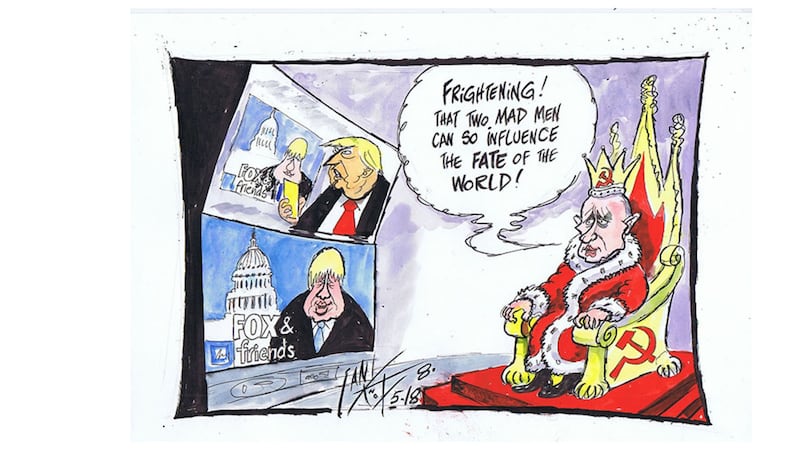Why do they do it? And when it ends in failure why do they do it again?
Party politics are as stuck here as ever they were during the Troubles, mutual mistrust as great, yet on it goes.
Last week’s West Tyrone by-election, unnoticed by many, still had some Sinn Féiners fretting about the reduced vote that nonetheless gave an unimpressive new candidate a Westminster seat she may hold for many years. It also gave the shrinking pool of SDLP loyalists a tremor of hope that the vote of their somewhat less wooden candidate was up by four per cent, neat equivalent of the SF dip.
The politics-minded need very little to keep them hooked, and since it still works here who can wonder at the compulsion in wider arenas. But those unbitten by the bug stand amazed.
Two recent books hack back over the disastrous run against Donald Trump by Hillary Clinton. From viewpoints fundamentally opposed to each other they build a portrait of a conflicted woman, permanently uncomfortable in her much-maligned skin, who has taken far more pain than pleasure from political campaigning. She is an introvert, the two authors agree, the opposite of sleazy people-pleaser husband Bill. Hillary Clinton has gone through agony to fail and fail again.
Chasing Hillary; Ten Years, Two Presidential Campaigns and One Intact Glass Ceiling by Amy Chozick is a journalist’s account, a professional read with likeable personal sub-text. The even more recent Dear Madam President is by Clinton’s Communications Director, Jennifer Palmieri. A long interview with Palmieri suggests her book complements Chozick’s, which might surprise neither of them. Chozick’s account features Palmieri as distant though softer edged than Clinton’s attack-dog media handlers, who saw Chozick as a traitor to her gender because rather than fawning she wrote incisively about the campaigning Clinton. And because she wrote for the New York Times, whose approval the campaign coveted.
The blurb says Clinton dominated Chozick’s life for more than a decade, the American presidential election system being the marathon that it is. The book whisks over the contest for the Democratic nomination with Barack Obama, the months of ‘is Hillary going to run’. Chozick is so observant that she sparks pity for Clinton, whom she clearly admired and wanted to like more. They never had even one informal conversation.
Palmieri told interviewer Decca Aikenhead in the Observer that her candidate lost because America wasn’t ready for a woman president, and how hard this was to deal with; from the full hour each day to make hair, make-up and clothes look both attractive and authoritative, to the old chestnut of how she could address mass rallies without sounding shrill. (The descriptor ‘shrill’ is reserved for public women.)
But thanks to Clinton preparing the road, Palmieri thought, the US might ‘now be ready to elect a woman as early as 2020. Could that woman be Clinton? Palmieri looks horrified. “Oh no. No, I would do an ankle-dive for that woman before I would let her go through that again. I could not let her go through that hell again.” She shudders. “Terrible, terrible, terrible, terrible.”
Chozick has her own experiences of daily misogyny (and anti-semitism, fixation with her curly ‘Jewish’ hair) of trolls who see reporting Clinton as disrespect to Bernie Sanders. She sees the strain of the ‘pink tax’ of make-up and hair on Hillary, a woman happier minus make-up in her Coke-bottle specs with hair tied back in a scrunchie. She also sees coldness off-stage and on, staff unwilling to correct the candidate, stretches when she refuses all contact.
One day a switched-off Chozick answers her phone to...Trump, for a chat as with many journalists. (Oh yes.) When, he asked, was the last time Clinton talked to you? ‘I said something I never should have said, five, six months since a press conference’. No keener on press conferences himself, Trump uses that at his rallies thereafter.
Many journalists noted Clinton’s bad judgment about big financial donors, those Wall Street speeches, but before the vote few made the most damaging connection. Clinton was running against ridiculous Trump, who convinced the crowd he was their voice against the elite.
Most working lives contain rough treatment, but politicians plead in public to be liked. Give me your vote, they say, then stand naked before the world while the response is weighed and measured. Chronicling their failings rarely fools the chronicler that any of them swan through. Maybe the wonder is not that some politicians are paranoid, but that any are easy human beings.








